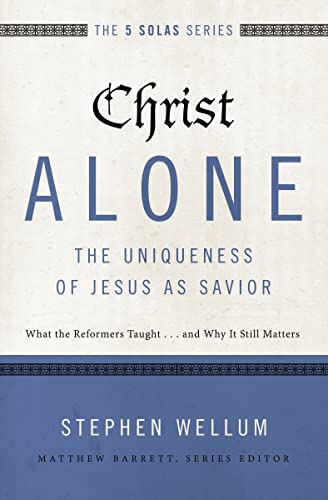All Categories


Christ Alone---The Uniqueness of Jesus as Savior: What the Reformers Taught...and Why It Still Matters (The Five Solas Series)
Share Tweet
Get it between 2025-02-06 to 2025-02-13. Additional 3 business days for provincial shipping.
*Price and Stocks may change without prior notice
*Packaging of actual item may differ from photo shown
- Electrical items MAY be 110 volts.
- 7 Day Return Policy
- All products are genuine and original
- Cash On Delivery/Cash Upon Pickup Available








About Christ Alone---The Uniqueness Of Jesus As
Professor of theology Stephen Wellum considers Christ's singular uniqueness and significance biblically, historically, and today, in our pluralistic and postmodern age. Christ Alone is a much-needed study and defense of the doctrine that provides coherency to the Christian faith. If the church is to proclaim the same Christ as the Reformers, we must understand and embrace solos Christus with the same clarity, conviction, urgency, and abundance of joy as the Reformers. To that end, Wellum: Recovers the Reformers' basic insights by focusing first on two teachings: the exclusive identity of Christ and his sufficient work. Follows the historical roots of the doctrine and its developments to show how the uniqueness of Christ has come under specific attack today. Retraces the storyline of Scripture, from Christ's unique identity and work as prophet, priest, and king, to the application of his work to believers and our covenantal union with him. Christ Alone seeks to recover a robust biblical and theological doctrine of Christ's person and work—and a renewed understanding that apart from Christ there is no salvation—in the face of today's challenges, unpacking why a fresh appraisal of the Reformation understanding of Christ alone is so important today. —THE FIVE SOLAS— Historians and theologians have long recognized that at the heart of the sixteenth-century Protestant Reformation were five declarations, often referred to as the "solas." These five statements summarize much of what the Reformation was about, and they distinguish Protestantism from other expressions of the Christian faith: that they place ultimate and final authority in the Scriptures, acknowledge the work of Christ alone as sufficient for redemption, recognize that salvation is by grace alone through faith alone, and seek to do all things for God’s glory. The Five Solas Series is more than a simple rehashing of these statements, but instead expounds upon the biblical reasoning behind them, leading to a more profound theological vision of our lives and callings as Christians and churches.





















